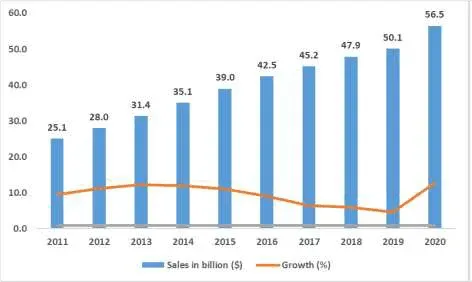PhD Candidate Spotlight: Investigating organic products at the brand level
 PhD Candidate
PhD Candidate
Kai Christine Lesage,
kai.lesage@grenoble-em.com
“As a part of the global consumer trends, sustainable and green consumption has grown viral for the past two decades.
The recent and ongoing Covid pandemic has helped trigger a renewed awareness of the importance of health and wellbeing. Consequently, people pay closer attention to their environment and the foods they consume. For more and more people, nutritious, healthy, and environmentally green in the food category means organic food products.
In 2020, organic food sales worldwide amounted to over 120 billion U.S. dollars, growing 570% from two decades ago (2022 survey report by Research Institute of Organic Agriculture, Organics International, and Organic Monitor).
According to the U.S. Organic Trade Association (2021), organic food has consistently kept a steady growth for the past decade in the U.S., accounting for most of the total organic sales.
In 2020, U.S. organic food sales soared to 56.5 billion dollars, a nearly 13% increase from the previous year (The Organic Trade Association 2021).
Responding to this rising demand, food manufacturers worldwide are increasingly developing and introducing new organic products to the marketplaces.
In 2020, 3,302 new organic product introductions were launched in the U.S. marketplace, a 43% increase from 2015 (USDA 2021). Nevertheless, the performance of organic products and the extent of ramifications to brands and their conventional counterparts (non-organic products) are unclear. Specifically whether adding organic products to a product portfolio helps or hurts overall brand performance remain questionable.
My second-year paper at the GEM Ph.D. program aims to contribute empirical evidence to the knowledge of this domain, investigating the effect of organic products at the brand level. This paper was written under the supervision of my former advisors, Christophe Haon and Shekhar Misra.
Analyzing the real-world point-of-sale data using the econometric panel data model in the Ready-to-Eat cereal category from 11,285 U.S. food retailers over two years (2018-2019), I have discovered that organic products positively affect overall brand performance and the sales increments attributed from the increased sales of conventional alternatives in the portfolio.
However, this effect can fluctuate to the market power of the parent brand or the price gap between the organic products and their conventional counterparts in the product line.
That is, a brand’s market power enhances the effect of organic products on brand performance while the price gap diminishes it.
Further analyses show that the price gap between organic and conventional products is critical to brand performance and equally important to the other products under the same parent brand.
The findings suggest that marketing managers should holistically approach product line extension and pricing strategy while introducing new green products like organics into the product mix. Additionally, these insights will help retailers optimize merchandising and private-label organic program development.”

Source: Organic Trade Association’s 2021 Organic Industry Survey from Organic Trade Association
Bio: Christine has over a decade of experience in developing and commercializing sustainable, innovative products onto the global markets. Her research interests include: Sustainability Marketing, Innovation, New Product Development and Introduction, Business-to-Business Marketing, Food Waste
Read More: Doctoral Knowledge Journal, issue #19
GettyImages: AlexRaths

